- Home
- Patrick E. Andrews
The Long-Knives 6 Page 2
The Long-Knives 6 Read online
Page 2
O’Callan sighed. He wished he had some of the campaigners he had ridden with during the Civil War. To his regret, however, they had forsaken the army and were undoubtedly well-settled-down in comfortable lives, making good money and growing enormous beer bellies—as might befit a gentleman saloonkeeper. With another sigh, he resigned himself to what he had and herded his charges over to the mess hall.
~*~
“Yah-nee-tah!”
It was a good morning to awaken and greet the Great Spirit. Water-smoke hung in thin wisps over the shallow pools that had made this camp a good one year around. The Sierra Dolores, the Meje-kanos called them, but they held little sorrow for the People.
Halcon, war leader of a free-roaming band of Apaches, stood, facing east, as the sun rose. A deep chill still held, as fierce here at sunrise as it had been the night before for the soldiers of Fort Dawson, some fifty miles distant. Yet the pale yellow rays of the sun seemed to invigorate the hard-muscled, squat Apache chief. He curled his lips in pleasure as he watched his son, Da-soda-hae, crawl from their wikiup and slip on his new breechcloth, adjusting its drape and height in a rakish, defiant manner. The boy slid his small feet into high-topped, hard-soled deerskin moccasins and trotted to where his father stood.
The slightly-built boy raised both arms above his head, fists clinched as was proper for a lad on the edge of manhood, and like his progenitor, greeted their god. His high soprano voice-rang clearly off the sandstone walls that guarded their rancheria from prying eyes in the distance. His religious duties performed, the smooth-faced child turned to a more important ritual, which had been a part of his life since the age of seven.
“Yata-he, o-sio—Good morning, Father,” he said solemnly. “What is it a son can do for his father on such a morning?”
Halcon flung out his left arm, as he had done every day for the past five years. “Run to the mountain,” he commanded.
“Hey-yaha, o-sio te! Yes, my father!” Da-soda-hae shouted with excitement and began to run in the long, enduring shuffle of the Apache warrior. Each day, the object selected—called, regardless of what it might be, “the mountain”—always lay a little further away. Now, on the morning of his twelfth year of life, the Apache youngster’s “mountain” stood some ten miles distant. As he ran, Da-soda-hae thought his small heart would burst with pride at being given so difficult a task. Today marked the first day he had been permitted to wear the treasured hunter’s breechcloth, and here he was given a morning run worthy of one about to be named a warrior!
Halcon’s lips crooked into another appreciative smile as he watched the slender body of his young son, the muscles rippling close under the surface as the boy ran away toward the far spring at the canyon’s end. He felt justifiable pride in this boy, the only child his latest wife, Niente, had given him. The youngster was lighter skinned like his mother, quite light in fact, considering that Apache boys ran naked until puberty, when they became hunters and were given their breechcloth. Only the coldest weather would find a boy-child clothed until his eleventh or twelfth year.
Everyone would have eaten by the time the boy returned. He would have to break his fast alone or with the older boys who were preparing to become warriors. It was good! He was the son of a chief—and a war chief at that, Halcon thought. He must be made ready for battle at an earlier age than most. The Thunder God spoke thus in a dream. Perhaps in his time he will join the great fight that will drive all of the pen-dik-oye—the white, round-eyes—from this land.
~*~
What a wonderful day for talking war. Now would be a good time to start a raiding party. When the pale ones are locked in their airless wikiups to escape the cold they will not come out to do battle. There are some fine cattle at that ranch not far from here, Halcon reflected. The band can circle and come out of the south; everyone will think we came across from Mexico. Then take them by surprise. Yes! It is a good day to make war on our enemies, Halcon exalted.
Who should go?
Some of the best fighting men, of course. A few young ones, seeking a warrior’s medicine bag. And we could maybe go by the station at the Painted Rocks. Always there is something to find there.
Some wagon or the pony-soldiers of the Fort Dawson. What a way to tell them that the Moon of Cold Hunger is coming again.
Burn the ranchos ... run off cattle ... and, best of all—kill the pony-soldiers.
Two
Four thin plumes of dust danced across the desert as O’Callan’s small patrol traveled slowly along the route that would take them to their rendezvous with the regimental mail at Painted Rock Crossing.
Bradley was in the lead, as point; Taylor and Whitlow each rode on a flank; and O’Callan covered the rear of their diamond formation with the pack mule. It was the best way to move through open country, where an attack could come from any direction.
O’Callan’s eyes regularly combed the horizon on all sides, staying ever alert despite the fact that he let his mind dwell on his imagination’s favorite subject: the life he would lead as a bar owner in Tucson.
Now a gentleman saloonkeeper wakes up in style, his mind mused. Not to the noise of a bloody bugle blowin’ reveille while ’tis still dark, but instead to the lovely twitterin’ o’ the darlin’ birds who are flittin’ through the treetops in the bright mornin’ sun. After dressin’ leisurely and shavin’ in the same slow manner, the gentleman saloonkeeper would go downstairs—he would naturally have hisself a fine two-story home—where his housekeeper would have breakfast all hot and proper waitin’ fer him—with at least a gallon of steamin’ hot coffee—along with the mornin’ paper. After polishin’ off his chow in the same dignified manner in which he’d dressed and shaved, this fine gent would then amble outta his house and stroll down to the business district o’ town to see how things was goin’.
“Bradley! Keep yer eyes to the front! Yer point man, dammit, not a flanker!” Charlie snapped his head back and O’Callan took up once again where his mind had left off.
Now all folks tip the hat quite respectful-like to a gentleman saloonkeeper as he goes on his way to his place of business. An’ bein’ a fine gentleman hisself, he quite naturally tips his hat back all polite-like. Na’ his real friendly greetin’s come when he enters his saloon, known far and wide as O’Callan’s—where the whiskey is first-rate, the beer kept as cool as humanly possible, and a feller can be sure of a square card game to while away his leisure hours. The bartender nods a respectful top-o’-the-mornin’ to his boss—he’s an ex-soljer, but no ex-quartermaster sergeant, them thievin’ rascals—and steps aside for the gentleman saloonkeeper to check the till.
“Goddammit, Whitlow! Raise yer hat off yer eyes. Ye can’t see nothin’ like that!”
Sure an’ the cash drawer would be plumb full, don’t ye know. So the gentleman saloonkeeper would order a round on the house and the lads give him a roarin’ cheer—as he justly deserves fer such fine Christian generosity—and the gentleman saloonkeeper would have a few fine snorts hisself, jest to be sociable. Faith! What a bloody fine life it’s gonna be.
At noon, O’Callan called a halt and signaled Bradley in. “This is gonna be our only hot meal till we reach Painted Rock Station. I don’t want to see a lot of smoke either. Boil yer coffee and cook yer meat fast. We’ll only be here fer half an hour.”
“Say, Sergeant,” Bradley queried. “If you’re only gonna let us have one hot meal, how about waitin’ until tonight? Hot grub always tastes best after a long day of ridin’.”
“Because,” O’Callan explained through thinly-worn patience, “I don’t want the light of a cozy fire or a bunch of glowing embers to attract any wanderin’ Apaches.”
“The Apaches are wintering in Mexico, Sergeant,” Whitlow protested, the thought of cold rations an offense to his finer sensibilities. “I heard some of the older soldiers discussing it in the barracks just the other day.”
“Did ye now?” O’Callan snorted. “Do ye think that Mr. Apache is that predictable? He might go in
to Mexico fer the winter and suddenly change his mind and come roarin’ back up here like a banshee straight outta Hell. The Good Lord lost control of the Apache two minutes after He created him. Taylor, you stay on guard with the horses. Whitlow, hurry up and eat so you can relieve him fer his own chow. Bradley, ye sit yerself down with me. We’re gonna shift directions a little this afternoon.”
“Hey, Sergeant,” Taylor called over to him,“—When are we gonna reach water? I’m out.”
“I’d say the next twenty-four hours are gonna be mighty dry fer ye, Taylor. Ye’ve been told to ration yer water on patrol.”
“Hell, you didn’t say we wouldn’ have no water. If I’d known that I wouldn’t have drunk it all.”
O’Callan shrugged. Then his eyes narrowed threateningly as he delivered a well-worn lecture. “We always tole ye to expect the worst out here. Ever’ man’s gotta depend on his own self-control or he’s a goner. There’s nothin’ more unforgivin’ than the desert. Except the deep blue waters of the ocean ...” Here he paused to give a dramatic shudder. “An element totally alien to the bones of a good cavalryman. Maybe Whitlow’ll give ye some of his. Ye sure as hell ain’t gettin’ none o’ mine.”
“I don’t want nothin’ from Whitlow. I’d rather die,” Taylor retorted, and spat to emphasize his determination.
“Stop spittin’! Ye’ve got a real thirsty day ahead o’ ye and ye’re gonna need all the wet ye’ve got. If yer mouth gets too dry, suck a pebble. Just be glad it ain’t summer.”
“Hey, Charlie,” Taylor began, looking for another source, “can you let me have some water when I get back to eat?”
“Nope. I got just enough to last me.”
“All I want is one goddamned lousy drink, Charlie!” Taylor’s voice had become edged with alarm.
Charlie pulled his rations from his saddlebags. “Elvin, I’ve rode herd from Mexico clean up to Kansas. I had some mighty good pals during that time and I’ve shared ever’thing I owned with ’em, except fer two things—my six-gun and my water.”
Taylor’s rodent eyes switched from Bradley to O’Callan and back. “Does that mean ... you won’t?”
“Yep.”
O’Callan smiled to himself. If Taylor stayed in the army for a hundred years, he’d never run out of water again. He was one step up the road to becoming a cavalry trooper. Sure an’ he’d better find some outlet for all that nastiness durin’ the next six weeks, O’Callan considered. He’d be hell on wheels, come the annual troopers’ Christmas party.
Ouch, naw! An’ hadn’t the last one been a regular skull-buster, the fiery-haired NCO recalled. Pity the poor devils what get stuck with organizing it this year. Still reflecting on the annual knuckle-scraping affair, O’Callan commenced to clean and put up his eating utensils.
After their meal, the four soldiers resumed the patrol, plodding along at a slow, steady gait as the afternoon progressed. O’Callan made the grumbling recruits vary the slow riding with long stretches of walking the horses.
“If a band of Apaches cross over from Mexico lookin’ fer trouble and find us, ye’ll be glad yer mounts ain’t all wore out,” he explained grudgingly. O’Callan hated to justify his orders or decisions to subordinates, though in the case of recruits he thought it best that they understood the why of what they were doing. High above in the clear, azure sky, a lone buzzard circled lazily.
~*~
Bobby Olsen felt as proud of his uniquely white man’s twelfth-year puberty ritual as Da-soda-hae had been of his natural Indian one. Although his bottom still smarted from where Paw had strapped him after the elder Olsen had discovered his son behind the low cattle shed on their ranch, a cornhusk cigarette in his lips, Bobby felt he had somehow come closer to being a man.
To Halcon and the young men of his raiding party, the overreaction of Bobby’s parent to his son simply trying to play a man’s role would have been totally incomprehensible. But their reason for being there was not to study the strange doings of the round-eyes. They came to steal cattle and horses, burn the home, and spill white-eye blood. Their ride had been long and hard and they had lost two horses, the beasts’ hearts having burst from the fast, endless pace. Now the time had come to strike.
Little Bobby Olsen didn’t live to gain his parents’ forgiveness, as he was sure he would. He died screaming in the center of the chicken yard, pierced by an Apache arrow an inch above his bellybutton. The jagged flint point sliced through his intestines and liver and lodged in his spinal cord. His shrieks of pain, ebbing away to the silence of death, terrified the chickens, who began to flutter and flop around the ocotillo-fenced enclosure, squawking with alarm.
Amulf Olsen, Bobby’s father, heard the screams of his mortally wounded son and the frightened yammering of his flock and came from the pigpen section of his livestock shed in time to get a .56-caliber ball high on the forehead, centered between his eyes. Three arrows struck him, too, protruding from the soft mound of his recently acquired middle-aged paunch like feathered decorations on a lady’s hat. He fell to his knees, dead before he hit the ground.
The oldest Olsen boy, who had been working with his father, made a desperate run for the house where his wife tended the newest addition to the Olsen clan, their baby, Julie. He made it through the door barely in time to shut and bar the entrance to the cabin. He handed his wife a Spencer carbine and opened a cabinet drawer for ammunition, making ready to stand off the attack.
Signaling with a bloodthirsty yell, Halcon led his warriors toward the house. Theo Olsen grabbed up his dead father’s Greener shotgun and let fly a ten-gauge blast of buckshot. He thought he had aimed at the leader of the raiding party, but the shot pattern went wide of the mark, bowling over a young brave to Halcon’s left. Blood flew in all directions as the warrior kicked out the last of his life.
The second barrel went into the dirt as slugs began to splatter against the shutters of the window where Theo stood firing. Across the room, the Spencer barked and he knew Lydia, an excellent shot, had accounted for another of the hostiles. The baby bawled in terror and her older sister clutched at her mother’s skirts.
“Non-an-tha, o-lathe!” Halcon shouted, and his warriors spread out in obedience to his command.
The Greener boomed again from inside and arrows rattled against the door. Several of the raiding party started to gather straw at the tall stack beside the cattle shed. A pig squealed in fright and a young boy, sort of an apprentice warrior, gave it something to complain about by planting two arrows in its round side. Quickly the men completed their task.
Tightly twisted straw torches were brought to where Halcon and his top two warriors crouched at the corner of the house. He struck flint to steel and blew on the spark-point until the dry straw flamed up. He handed the firebrand to one of the others and repeated the operation until all were blazing. Then they tossed them onto the thatched roof of the adobe ranch house.
“Oh, dear God!” Mrs. Olsen shouted hysterically. “They’re burning us out.”
Flames and smoke hung particularly thick near the door. Theo abandoned that position to seek targets as the braves ran off the livestock. Soon there came a regular, violent pounding on the door as the other members of the hostile band began to try breaking it in.
Heat and acrid fumes drove the two women to panic. Anything, they believed in their extremity, would be better than burning to death. Despite Theo’s horrified shouts to stop, they rushed to the door ... and pulled the bar.
Two Apaches dashed into the room as the portal gave way. They tumbled onto the floor as twenty-one .28-caliber buckshot pellets lashed into their bronze skin, shredding their sides and splashing the interior of the house with their blood. The next one in shot Theo in the throat. He made a brief gurgling sound, then lapsed into death. He, like his father and little brother, could be considered lucky.
The Olsen women soon learned how entirely wrong they had been about anything being better than burning alive. When the first savage, a boy of hardly more than fourteen, h
ad finished with little eight-year-old Gretta, her pain had already become lost in a dreamlike numbness. Her mother and grandmother shrieked and struggled with their oppressors in vein attempts to avoid that “fate worse than death.” But Gretta received them passively, muttering over and over to herself.
By the time the Apache boy returned for seconds, Gretta had become severely weakened by blood loss. As he turned over her supine form, she fluttered her eyelids and quietly died.
Oh, yes, the lucky ones were already dead.
What came after the rape was something awful. Much too evil for the Olsen menfolk’s eyes to have witnessed.
~*~
Watching his men with a critical eye, O’Callan emitted a long, piercing whistle. Time to make camp, and he wasn’t entirely displeased with how the recruits had performed in their maiden effort at becoming troopers. Wouldn’t do, though, to let them know that. Keep a man off balance a little and he’ll try a bit harder. He waved his arm, signaling the patrol to ride in and assemble on him.
They dismounted and limped slowly toward their sergeant in the lengthening red shadows of the desert sunset. They had done more walking than riding. Cavalry boots had not been designed for such activity and the pained expressions on their faces revealed the effect of their day’s efforts.
“Congratulations. Ye’ve spent yer very first day on patrol.”

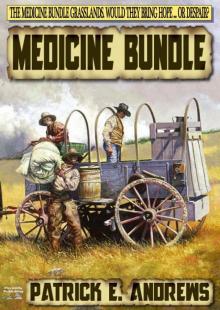 Medicine Bundle
Medicine Bundle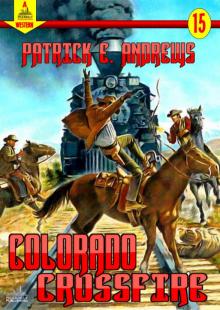 Colorado Crossfire
Colorado Crossfire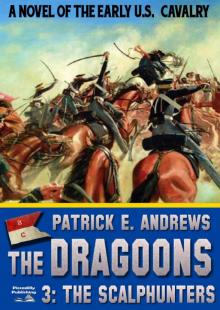 The Dragoons 3
The Dragoons 3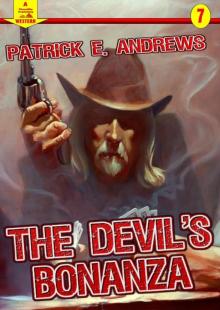 The Devil's Bonanza (A Piccadilly Publishing Western Book
The Devil's Bonanza (A Piccadilly Publishing Western Book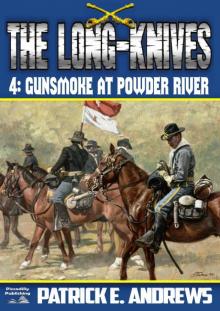 Gunsmoke at Powder River (The Long-Knives #4)
Gunsmoke at Powder River (The Long-Knives #4)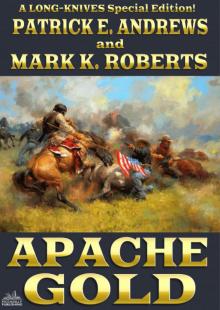 The Long-Knives 6
The Long-Knives 6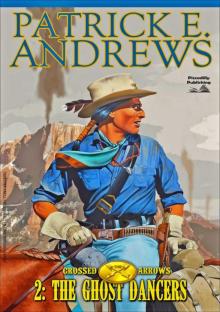 The Ghost Dancers (A Crossed Arrows Western Book 2)
The Ghost Dancers (A Crossed Arrows Western Book 2)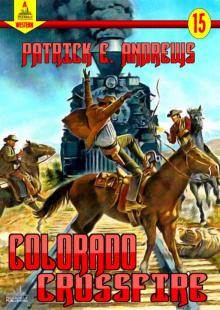 Colorado Crossfire (A Piccadilly Pulishing Western Book 15)
Colorado Crossfire (A Piccadilly Pulishing Western Book 15)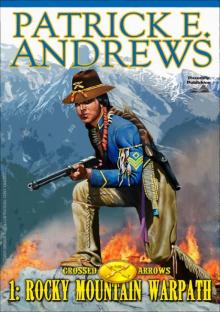 Rocky Mountain Warpath (A Crossed Arrows Western Book 1)
Rocky Mountain Warpath (A Crossed Arrows Western Book 1)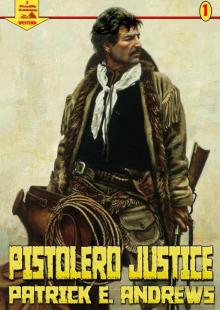 Pistolero Justice (A Piccadilly Publishing Western
Pistolero Justice (A Piccadilly Publishing Western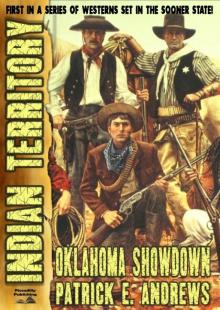 Oklahoma Showdown (An Indian Territory Western Book 1)
Oklahoma Showdown (An Indian Territory Western Book 1)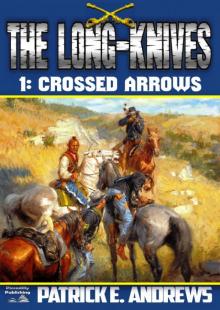 Crossed Arrows (A Long-Knives Western Book 1)
Crossed Arrows (A Long-Knives Western Book 1)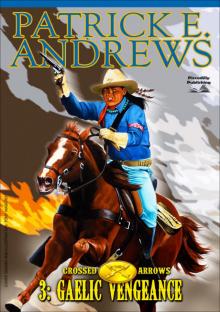 Crossed Arrows 3
Crossed Arrows 3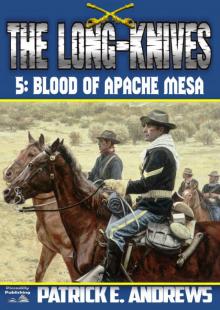 Blood of Apache Mesa
Blood of Apache Mesa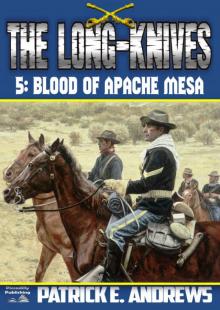 The Long-Knives 5
The Long-Knives 5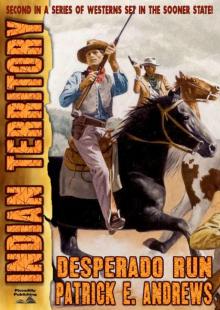 Desperado Run (An Indian Territory Western Book 2)
Desperado Run (An Indian Territory Western Book 2)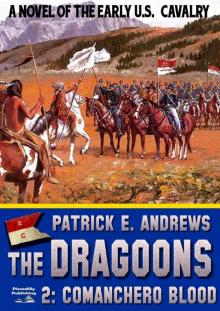 Comanchero Blood (A Dragoons Western Book 2)
Comanchero Blood (A Dragoons Western Book 2)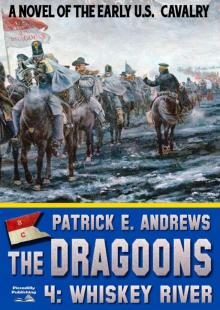 The Dragoons 4
The Dragoons 4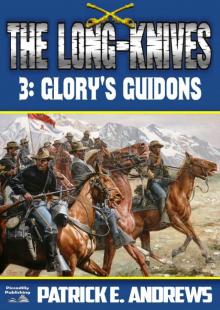 Glory's Guidons (The Long-Knives US Cavalry Western Book 3)
Glory's Guidons (The Long-Knives US Cavalry Western Book 3)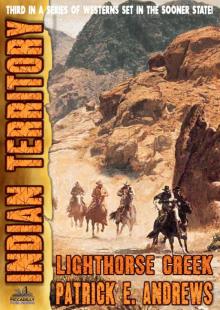 Indian Territory 3
Indian Territory 3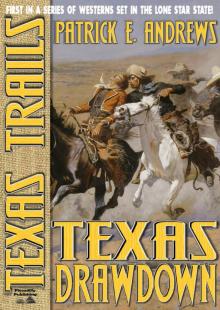 Texas Trails 1
Texas Trails 1